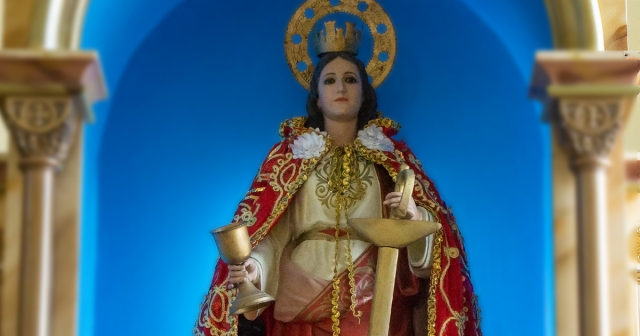On December 4th, a date marked in Cuba's religious and cultural calendar by the celebration of Santa Bárbara in Christianity and Changó in the Yoruba religion, millions of Cubans woke up without electricity in their homes following the third collapse of the National Electric System (SEN) in less than two months.
The coincidence has not gone unnoticed, given the symbolism of these spiritual figures that represent strength, power, and justice—values that the Cuban people yearn for amidst their daily struggles.
Santa Bárbara and Changó: Energy and Resilience
Santa Bárbara, venerated as the protector against storms and lightning, and Changó, the orisha of thunder, lightning, and fire, share a profound connection with energy and strength.
For many believers, these spiritual symbols evoke not just protection, but also the ability to overcome adversities.
However, on December 4th, the widespread blackout that affects the country seems to overshadow the light that these saints represent in popular imagination.
The blackout is perceived as a paradox: On a day dedicated to the deities of power, electricity—an element that symbolizes modernity and vital energy—is absent from hundreds of thousands of Cuban homes.
The light at the end of the tunnel?
The coincidence of the third massive blackout in less than two months with the day of Santa Bárbara and Changó serves as a reminder to not only remember Santa Bárbara when thunder strikes.
"It's ironic that on a day like today, when we celebrate energy and power, we are in the dark," commented a devotee from Santiago de Cuba on social media.
In this context, some have interpreted this interruption as a reminder of the challenges they face and the need to demand, now more than ever, the justice and strength that both deities represent.
Frequently Asked Questions about Blackouts and the Energy Crisis in Cuba
Why did massive blackouts occur in Cuba on December 4, 2024?
On December 4th, the third collapse of the National Electric System (SEN) occurred in less than two months, leaving millions of Cubans without electricity. This happened on a symbolic day for many Cubans, who celebrate Santa Bárbara and Changó, deities associated with energy and strength, making the blackout feel like a paradox and a reminder of the daily hardships faced by the Cuban people.
What is the current situation of the electrical system in Cuba?
The situation of the electrical system in Cuba is extremely critical. The deficit in electricity generation has reached critical levels, with outages exceeding 1,000 MW during peak hours. A lack of maintenance, breakdowns, and fuel shortages are factors that have exacerbated this crisis, affecting a large part of the Cuban population.
How does the energy crisis affect the daily lives of Cubans?
The energy crisis severely impacts the daily lives of Cubans, with prolonged blackouts disrupting the normal operation of homes, schools, and businesses. The lack of electricity also affects food preservation and access to basic services like water and communications, leading to frustration and desperation among the population.
What has the Cuban government done to address the energy crisis?
The Cuban government has attempted to implement measures to address the energy crisis, such as the maintenance of thermoelectric plants and the planning of rotating blackouts. However, these measures have not been sufficient to stabilize the electricity supply, and the situation remains critical, with outdated energy infrastructure and a lack of adequate investments.
Filed under:
